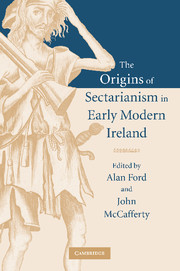Book contents
- Frontmatter
- Contents
- Preface
- List of contributors
- List of abbreviations
- 1 Living together, living apart: sectarianism in early modern Ireland
- 2 Confessionalisation in Ireland: periodisation and character, 1534–1649
- 3 Protestant prelates or godly pastors? The dilemma of the early Stuart episcopate
- 4 ‘In imitation of that holy patron of prelates the blessed St Charles’: episcopal activity in Ireland and the formation of a confessional identity, 1618–1653
- 5 A haven of popery: English Catholic migration to Ireland in the age of plantations
- 6 The Irish historical renaissance and the shaping of Protestant history
- 7 Religion, culture and the bardic elite in early modern Ireland
- 8 The political and religious thought of Florence Conry and Hugh McCaughwell
- 9 Sectarianism: division and dissent in Irish Catholicism
- 10 Purity of blood and purity of faith in early modern Ireland
- 11 Concluding reflection: confronting the violence of the Irish reformations
- Index
6 - The Irish historical renaissance and the shaping of Protestant history
Published online by Cambridge University Press: 24 November 2009
- Frontmatter
- Contents
- Preface
- List of contributors
- List of abbreviations
- 1 Living together, living apart: sectarianism in early modern Ireland
- 2 Confessionalisation in Ireland: periodisation and character, 1534–1649
- 3 Protestant prelates or godly pastors? The dilemma of the early Stuart episcopate
- 4 ‘In imitation of that holy patron of prelates the blessed St Charles’: episcopal activity in Ireland and the formation of a confessional identity, 1618–1653
- 5 A haven of popery: English Catholic migration to Ireland in the age of plantations
- 6 The Irish historical renaissance and the shaping of Protestant history
- 7 Religion, culture and the bardic elite in early modern Ireland
- 8 The political and religious thought of Florence Conry and Hugh McCaughwell
- 9 Sectarianism: division and dissent in Irish Catholicism
- 10 Purity of blood and purity of faith in early modern Ireland
- 11 Concluding reflection: confronting the violence of the Irish reformations
- Index
Summary
The later sixteenth and early seventeenth centuries were marked by an outpouring of historical work about Ireland. From Holinshed's Chronicles of England, Scotland and Ireland in 1577, to the publication of the lifetime's labours of Colgan and the Irish Franciscan hagiographers from 1645, the writing of history was at the forefront of Irish scholarship. Indeed, such was the scale of intellectual endeavour that this period can justly be designated the Irish historical renaissance, the beginning of the investigation of Ireland's past using recognisably modern scholarly methods.
The intellectual currents which nourished this dramatic growth can easily be outlined. An essential foundation was provided by the medieval method of annalistic compilation, together with the antiquarian instinct for unearthing manuscripts and artefacts, both of which helped to establish essential facts and chronologies without which history could not have been written. The methodological breakthrough in identifying and analysing original sources was provided by Renaissance humanism, with its determination to return ad fontes. More specific to Irish scholarship were the professional historians, poets, brehons and scribes who sought to maintain the vitality of the Gaelic historical tradition with its rich inheritance of genealogies, annals and saints' lives, and the distinctive form of Anglo-Irish colonial historiography created by that master of racial stereotyping, the twelfth-century Welsh historian, Giraldus Cambrensis. And, finally, there were two crucial driving forces common across all European nations: the growing sense of patriotic pride which led scholars to try and defend and glorify their native land and its past; and the polemical historiography of the reformation and the counter-reformation, inspired by each side's determination to establish its own exclusive historical legitimacy.
- Type
- Chapter
- Information
- The Origins of Sectarianism in Early Modern Ireland , pp. 127 - 157Publisher: Cambridge University PressPrint publication year: 2005
- 1
- Cited by



